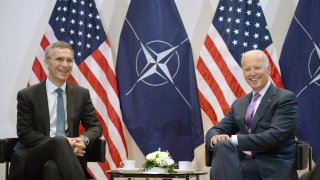
- President-elect Joe Biden, with the experience he and his team bring to our disruptive times, has a shot at providing transformative leadership for the world.
- There was no stronger sign than this week's release by the European Commission, speaking for 27 countries representing almost 18% of global GDP, of a "New EU-US Agenda for Global Change."
- The paper embraces Biden's call for a summit of democracies in his first year in office.
Joe Biden has that rarest of opportunities that history provides: the chance to be a transformative foreign policy president.
That opening arises due to urgent need to tackle Covid-19 and its global economic threats. It comes because of the growing necessity to better manage China's authoritarian rise. It also emerges due to a desire by U.S. partners to rapidly turn the page on the Trump administration and restore common cause among leading democracies.
There was no stronger sign of that than this week's release by the European Commission, speaking for 27 countries representing almost 18% of global GDP, of an eleven-page "New EU-US Agenda for Global Change."
Its purpose, with proposals that range from Covid-19 to climate and from trade to technology, is to seize what it called "a once in a generation" opportunity. The paper embraces Biden's call for a summit of democracies in his first year in office and lays out a transatlantic agenda that should be "the linchpin of a new global alliance of like-minded partners."
Says the paper, "As open democratic societies and market economies, the EU and the US agree on the strategic challenge presented by China's growing international assertiveness, even if we do not always agree on the best way to address this."
President-elect Biden's shot at transformative leadership is also the result of the experience he and his team bring to our disruptive times. "The forces are aligned for an American leader like Joe Biden," said Chuck Hagel, his long-time friend and former secretary of Defense. "There's a high state of confusion, uncertainty and volatility. The world is looking for a north star leader who has the capability, knowledge, steadiness and wisdom to help correct our direction. There's hardly a leader in the world he doesn't know or hasn't dealt with."
Money Report
Biden may also quickly discover that foreign policy is where he can most easily become the unifying president he aspires to be. On domestic issues, it will be challenging to manage the far left of his own party and hardline Republicans. Meeting the Chinese challenge is one of the few issues that almost everyone agrees is an urgent necessity.
To achieve that, President-elect Biden with his European partners must start by reversing the erosion of transatlantic common cause that has defined most the last 75 years. It has been that partnership that helped create the rules-based global system that advanced democracy, spread prosperity through expanded trade and investment, helped prevent great power conflict and, ultimately, brought the Cold War to a peaceful end with the collapse of the Soviet Union.
The seeds to that order, which is now under threat, were planted long before World War II had ended by President Franklin Delano Roosevelt and British Prime Minister Winston Churchill when they signed the Atlantic Charter of August 1941. By useful coincidence, the charter will celebrate its 80th anniversary in President Biden's first summer in office.
At the time that Roosevelt and Churchill met aboard the U.S.S. Augusta, with the U.S. still four months away from entering the war, it seemed as though the Axis powers of Hitler's Germany and Mussolini's Italy were ascendant.
FDR and Churchill, representing the two most significant democracies of their times, didn't draw up anything as formal as a treaty but rather they stated "certain common principles in the national policies of their respective countries on which they based their hopes for a better future for the world."
The Atlantic Charter's lack of legal force didn't diminish its historic significance. It sent the world a message of American purpose, it provided hope to occupied countries, and it laid the foundation for a post-war order.
Vice President Harry Truman became an unlikely transformative president after FDR's death in April 1945, bringing World War II to a successful end and then working to construct that order.
That included the Bretton Woods Agreement legislation and the United Nations Participation Act in 1945. In March 1947, he proclaimed the Truman Doctrine in a Joint Session of Congress, a policy whose purpose was to contain the Soviet Union and "support free peoples who are resisting attempted subjugation by armed minorities or by outside pressures."
What would follow shortly thereafter in April 1948 would be the Marshall Plan to rebuild war-torn Western Europe and then the North Atlantic Treaty in 1949, creating NATO and bringing a U.S. security guarantee to all its European allies.
"Ronald Reagan and George H.W. Bush may have expedited and managed the Cold War's end, but it was Harry Truman whom history called upon to engage the Soviet Union in a struggle for world supremacy during a time when most Americans were war-weary and exhausted by their role in resolving the endless tragedies of twentieth-century Europe," writes Joe Scarborough in his excellent new book, Saving Freedom: Truman, the Cold War and the Fight for Western Civilization.
Truman serves as the most appropriate role model for President-elect Biden. Truman created the global system, the ascendance of democratic rule and the liberal international economic order that Biden must now work to restore, reinvigorate and reinvent. of
If Biden doesn't want to throw away his shot, to paraphrase Alexander Hamilton from the eponymous musical, he'll need to understand both what makes his task easier and harder than that of Truman.
What will be easier is that he doesn't need to create the institutions and practices that his predecessors invented out of the chaos and destruction of World War II. Instead, he needs to help manage the changes required for a new, more globally complex era.
A good first step would be a "Global Charter," in the same spirit as the Atlantic Charter, but a small enough group of global democracies to give it legitimacy but also make the process manageable.
What also makes Biden's task easier is he doesn't have to pull this off at a time of war. The downside is he lacks Truman's advantage of working with international and domestic partners who had the memory of two world wars and the desire to head off a third.
What also makes Biden's job harder is that the United States has only roughly 24 % of global GDP, compared by half of global GDP in 1945, so it lacks the leverage it once had. That will require a more astute and nimble partnering with others.
What's giving this effort even greater urgency is the realization that Joe Biden is 78 years old. It is hard to imagine any successor with the philosophies, experience or conviction to play this historic role.
Frederick Kempe is a best-selling author, prize-winning journalist and president & CEO of the Atlantic Council, one of the United States' most influential think tanks on global affairs. He worked at The Wall Street Journal for more than 25 years as a foreign correspondent, assistant managing editor and as the longest-serving editor of the paper's European edition. His latest book – "Berlin 1961: Kennedy, Khrushchev, and the Most Dangerous Place on Earth" – was a New York Times best-seller and has been published in more than a dozen languages. Follow him on Twitter @FredKempe and subscribe here to Inflection Points, his look each Saturday at the past week's top stories and trends.
For more insight from CNBC contributors, follow @CNBCopinion on Twitter.






